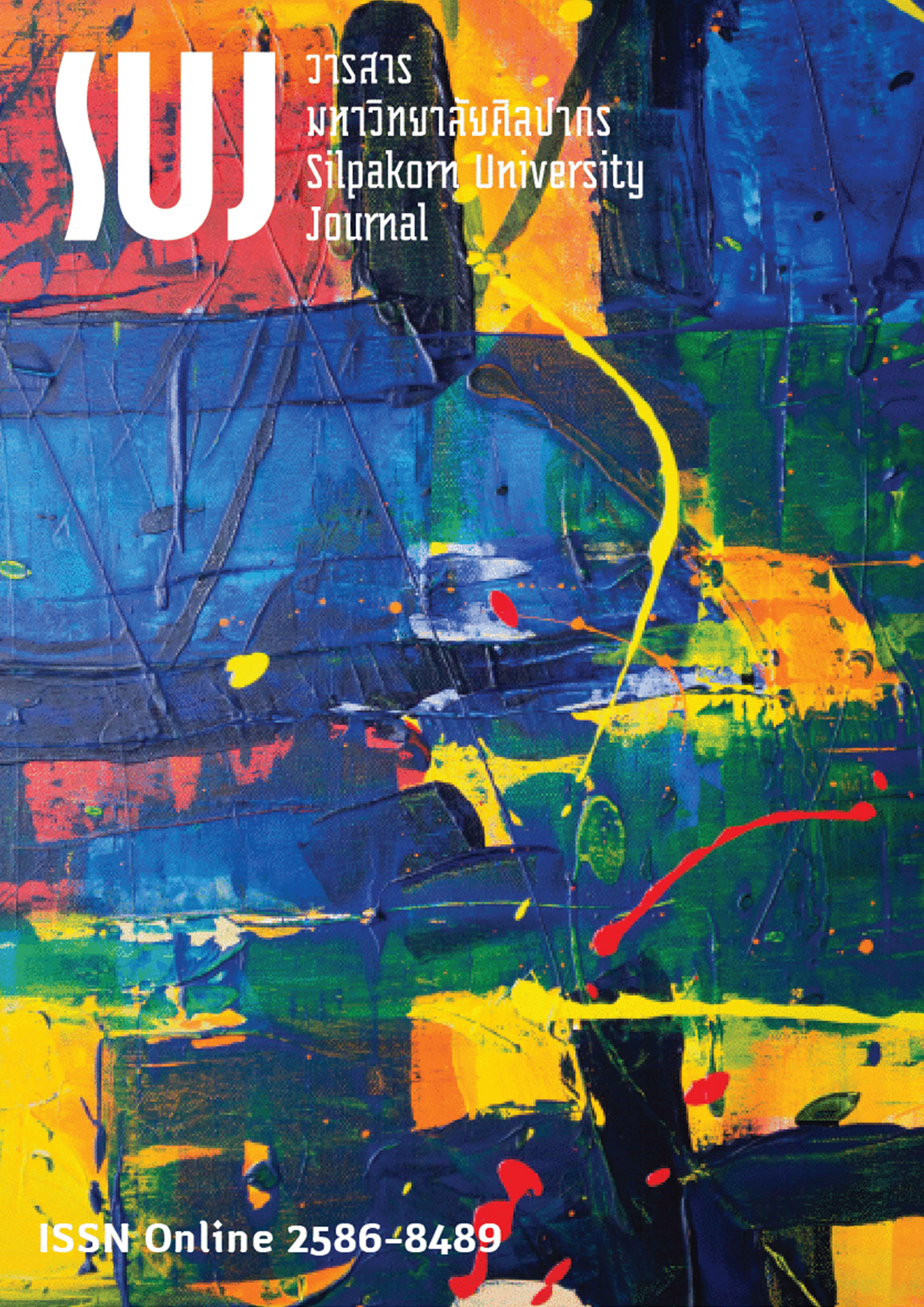การศึกษาผู้นำในวรรณกรรมสามก๊กด้วยทฤษฎีจิตวิทยาบุคลิกภาพ (A study of leadership in The Romance of the Three Kingdoms through the Theory of Personality Psychology)
Main Article Content
Abstract
งานวิจัยฉบับนี้ มีวัตถุประสงค์เพื่อศึกษาและอธิบายพฤติกรรมและการตัดสินใจในสถานการณ์ต่าง ๆ ของผู้นำในวรรณกรรมสามก๊ก ด้วยทฤษฎีจิตวิทยาบุคลิกภาพ ผู้เขียนได้ศึกษาผู้นำในวรรณกรรมสามก๊กฉบับแปลใหม่ของ วรรณไว พัธโนทัย ได้แก่ เล่าปี่ โจโฉ และซุนกวน ด้วยทฤษฎีจิตวิทยาบุคลิกภาพของอัลเฟรด แอดเลอร์ (Alfred Adler) อับราฮัม มาสโลว์ (Abraham Maslow) คาเรน ฮอร์นาย (Karen Horney) และคาร์ล แรนซัม โรเจอร์ส (Carl Ransom Rogers) ผลการศึกษาพบว่า ผู้นำทั้งสามมีเป้าหมายสูงสุดในการบรรลุศักยภาพของตนเองที่สอดคล้องกัน กล่าวคือ ต่างพยายามยกสภาพความเป็นอยู่ของราษฎรให้ดีขึ้น และต้องการปกครองราษฎรของตนให้อยู่เย็นเป็นสุข แต่มีข้อแตกต่างกันที่แนวคิดและวิธีการ ในบรรดาผู้นำทั้งสาม มีเพียงซุนกวนที่บรรลุศักยภาพของตนเองเพราะสามารถรักษาดินแดนง่อก๊กให้ปลอดภัยตลอดช่วงเวลาที่เขาปกครองอยู่ อย่างไรก็ตาม ผู้นำทั้งสามก็มีคุณลักษณะที่ผู้นำควรมี คือ ความสร้างสรรค์ เล่าปี่ใช้ความสร้างสรรค์ในการเอาตัวรอด และการพลิกแพลงสถานการณ์ โจโฉใช้ความสร้างสรรค์ในการสร้างอำนาจ และการก่อร่างสร้างตัว ส่วนซุนกวนใช้ความสร้างสรรค์ในการบริหารคน การเลือกใช้คน นับว่าผู้นำมีความโดดเด่นในเรื่องความคิดสร้างสรรค์ที่แตกต่างกัน และความสร้างสรรค์นี้ถือเป็นคุณลักษณะสำคัญที่ทำให้ผู้นำสามารถตั้งตัวเป็นใหญ่ในแผ่นดินได้ การศึกษาผู้นำในวรรณกรรมสามก๊กด้วยทฤษฎีจิตวิทยาบุคลิกภาพจึงทำให้เห็นความแตกต่างของผู้นำแต่ละคน ทำให้ผู้อ่านเข้าใจบุคลิกภาพภายในของผู้นำ และเข้าใจวรรณกรรมสามก๊กได้ดียิ่งขึ้น
This research aims to study and explain the behavior and decisions of leaders in various situations as portrayed in The Romance of the Three Kingdoms through the prism of personality psychology. The text used is from the new Thai-translated version by Wanwai Phathanothai. The selected leaders were Liu Bei, Cao Cao, and Sun Quan. The personality psychology theories of Alfred Adler, Abraham Maslow, Karen Horney, and Carl Ransom Rogers were employed to provide an analytical framework. The research found that all three leaders shared the same ultimate goal of achieving their own potential: to uplift the quality of life of the people in their territory and to govern them with peace and happiness. The main differences among the three leaders were their ideologies and their methods. Of the three leaders, only Sun Quan achieved self-actualization as he was able to protect the Kingdom of Wu throughout his entire reign. Nevertheless, all three leaders possessed one essential leadership characteristic which was creativity. Liu Bei was able to use this quality to survive and transform crises into opportunities. Cao Cao used his creativity to gain more power while Sun Quan used it to manage his subordinates by putting the right man in the right job. Hence, this creativity strongly empowered them to become great leaders of their realms. Thus, studying the leaders in this literature through the prism of personality psychology allows the reader to realize their differences and understand their personalities, which then enabled a greater understanding of the work.
Downloads
Article Details

This work is licensed under a Creative Commons Attribution-NonCommercial-NoDerivatives 4.0 International License.
References
Anunthawichak, Suang-I, Phiphopaekasit, Phairhoote, Wutthiyothin, Kunakorn, Paesurin, Pongsatorn, & Mongkonchaisup, Panupong. (2021). A Study of the Characteristics and Behaviors of the Romance of the Three Kingdoms Leaders that Negatively Affecting Organizational Management (การศึกษาคุณลักษณะและพฤติกรรมของผู้นำในวรรณกรรมสามก๊กที่ส่งผลเสียต่อการบริหารจัดการองค์กร). Local Administration Journal, 14(2): 195-212.
Chantarawong, Sombut. (1995). Political Meanings of the Romance of the Three Kingdoms by Chao Phraya Praklung (Hon) (ความหมายทางการเมืองของสามก๊กฉบับเจ้าพระยาพระคลัง (หน)). Bangkok: Matichon.
Jinamedhī, Jakkaphong, Bridhyankura, Pansa, & Tong-In, Termsak. (2020). The Political Concept of Zhuge Liang the Romance of the Three Kingdoms Literature Upon Thai Society (แนวคิดทางการเมืองของขงเบ้งในวรรณกรรมสามก๊กที่มีต่อสังคมไทย). Journal of MCU Social Science Review, 9(1): 223-232.
Keawkungwan, Srireun. (2019). Theories of Personality Psychology (ทฤษฎีจิตวิทยาบุคลิกภาพ) (18th ed.). Bangkok: Thaihealthbook.
Lojsirisilp, Decha. (2012). Decision under Crisis: Leaders Behavior in the Romance of Three Kingdoms (การตัดสินใจภายใต้สถานการณ์วิกฤติ: พฤติกรรรมผู้นำในพงศาวดารสามก๊ก). Journal of Liberal Arts, Ubon Ratchathani University, 8(1): 237-258.
Numtong, Kanokporn. (2017). The Image of Cao Cao in Chinese Culture (ภาพลักษณ์ของโจโฉในวัฒนธรรมจีน). Chinese Studies Journal, 10(1): 83-108.
Oungpra, Noppamas. (2008). Personality Theory and Adaptation (ทฤษฎีบุคลิกภาพและการปรับตัว)(18th ed.). Bangkok: Thammasat University.
Patthanothai, Wanwai. (2001). The Romance of the Three Kingdoms by Wanwai Patthanothai (สามก๊กฉบับแปลใหม่). Bangkok: Thammachat.
Pidtanung, Wisaruta. (2021). The Influence of Romance of the Three Kingdoms in Thai Political Context (อิทธิพลของวรรณกรรมสามก๊กในบริบทการเมืองไทย). Journal of Business Administration and Social Sciences Ramkhamhaeng University, 3(2): 99-112.
The Translators and Interpreters Association of Thailand. (2022). Surintharacha Award (รางวัลสุรินทราชา). [Online]. Retrieved October 10, 2022 from http://www.thaitiat.org/surintharachaaward/
Wuttipattananon, Teerawat, & Kusumavalee, Sombat. (2018). Analyzing Leadership of Leaders in the Literature Romance of the Three Kingdoms (การวิเคราะห์ภาวะผู้นำของผู้นำในวรรณกรรมสามก๊ก). Human Resource and Organization Development Journal, 10(2): 110-142.


